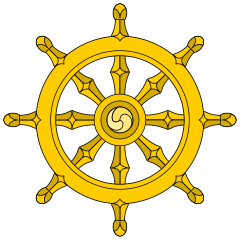Walter Nowick
Walter Nowick (January 29, 1926—February 6, 2013) was an American former teacher of Rinzai Zen. He was a Juilliard-trained pianist and a veteran of World War II. He studied Zen in Japan for sixteen years while teaching university-level piano and voice there, then returned to the United States to teach music and Zen in Surry, Maine, where he founded Moonspring Hermitage. He founded the Surry Opera Company in the mid-1980s and retired from formal Zen teaching in 1985.[1]
| Part of a series on |
| Zen Buddhism |
|---|
 |
|
Persons Chán in China Classical
Contemporary
Zen in Japan Seon in Korea Thiền in Vietnam Zen / Chán in the USA Category: Zen Buddhists |
|
Doctrines
|
|
Awakening |
|
Practice |
|
Schools
|
|
Related schools |
| Part of a series on |
| Buddhism |
|---|
 |
|
|
|
Biography
Early years
Nowick's parents were immigrants of Russian-Polish origin. He grew up on Long Island, New York on a potato farm. He showed an early talent for music and studied piano at Juilliard with Henriette Michaelson. She summered in Surry, and he first came to Maine as a teenager to study with her.
He left his piano study to serve in the Pacific during World War II, taking part in the final sweep of Okinawa after the island had surrendered. He eventually returned to his piano studies with Miss Michaelson. Having seen a book on Zen on her coffee table, began to sit at the First Zen Institute of America, where Michaelson was a member.
Japan
Nowick went to Japan in 1950 to study Zen with Zuigan Gotō of Daitoku-ji. Nowick stayed in Japan some sixteen years until the death of Zuigan Gotō in 1965. Janwillem van de Wetering lived a year and a half in Daitoku-Ji with Nowick, and described this in The Empty Mirror. Sōkō Morinaga, Walter Nowick's Dharma brother, wrote in Novice to Master about traditional practices at the time Walter first went to Japan.
During Nowick's years in Japan he supported himself teaching piano and voice at the Kyoto Women's University. Nowick became known in the United States Zen community, which was very small at the time, as the first Westerner to have gone to Japan and completed the traditional Zen practice on their terms. Nowick was not given formal Dharma transmission—a point emphasized by Sōkō Morinaga Roshi during a visit to London.[2] Nowick was also never ordained a priest but instead remained a layman. Three students of Zuigan Gotō are listed: Oda Sessō, Sōkō Morinaga and Walter Nowick.[3]
Moonspring Hermitage
After the death of Zuigan Gotō in 1965, Nowick returned to the United States and began teaching Japanese musicians at his farm in Surry. After a few years, students of Zen began to arrive and many settled nearby. Some built homes on land provided by Walter, sometimes living on his farm. There were both single and married people with children. A student organization was incorporated as Moonspring Hermitage, a non-profit religious group, with a board of officers elected from among the students. The students built a zendo and meeting hall on a parcel of Nowick's land, with an agreement specifying that the corporation and buildings belonged to the students and that the land would be turned over to them after fifteen years.[4]
A Rinzai Zen-style practice was established, though Nowick did not practice many of the externals of Japanese Zen. There were no chants, robes, Buddhist names, lectures, precepts, and such. Instead there was just work on his farm and koan study. At its peak in the mid-1970s, the group may have had an overall membership of 40 people. In 1975, Janwillem van de Wetering documented his experiences in this community in A Glimpse of Nothingness. His third Zen-book "Afterzen" has been dedicated to Walter Nowick.[5]
Surry Opera Company
In the mid-eighties, concerned with the looming possibility of nuclear holocaust, Nowick founded the Surry Opera Company, an amateur group that intended to strengthen ties with the Soviet Union at a personal level. This group went to the USSR a number of times and received national attention in its heyday.[6]
In 1985, shortly after the founding of the opera company, some of his students became concerned that he was spending too much time on the project. He offered his resignation as a teacher, which was accepted by the student committee, and devoted himself to music full-time. After some legal wrangling, the property reverted as had been agreed before the student committee accepted his resignation, to the corporation, which had been reconstituted as the Morgan Bay Zendo, with Walter reserving some rights of usage. The MBZ has used and maintained the property ever since, with Walter visiting occasionally.
Walter Nowick continued to live in Surry much of his life, spending some of the winter in Japan and Russia. In the summer, he gave piano concerts and Russians come for extended visits.
Nowick suffered a stroke in 2012 and also developed pneumonia. In declining health, he removed his feeding tube shortly before his death in the morning hours of February 6, 2013. He was 87 years old.[7]
See also
References
- Zen and The Art Of Opera by EVAN EISENBERG, September 2, 2001 New York Times
- Lachs 2011, p. 24.
- Buddhist Studies WWW Virtual Library, Hakuin School of Zen Buddhism
- Lachs 2011, p. 33.
- Wetering 1999.
- ellsworthamerican.com, Singing for Peace: Surry Opera Company
- Walter Nowick, Pianist And Zen Teacher, Dies At 87, February 07, 2013 Sweeping Zen
Sources
- Lachs, Stuart (2011), When the Saints Go Marching In: Modern Day Zen Hagiography (PDF)
- Wetering, Janwillem van de (1999), Afterzen. Experiences of a Zen Student Out on His Ear, New York: St. Martin's Press
External links
- Article on Walter Nowick featured in ellsworthamerican.com
- Photograph of Walter Nowick, 2004
- Dana Sawyer, Tricycle Magazine (2009), Down East Roshi
- James Shaheen, Tricycle Magazine (2011), Zen Sinners, Zen Saints: Tricycle Responds. Response to Stuart Lachs' When the Saints Go Marching In: Modern Day Zen Hagiography